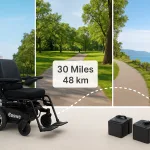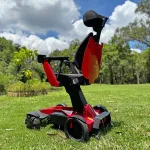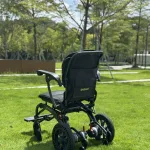Navigating the UK healthcare system can be daunting, especially when you’re trying to determine what mobility support is available through the NHS, local authorities, or personal health budgets. If you or someone you care for is considering an electric wheelchair, you might be wondering:
“Can I get help paying for it, and what are my options?”
Let’s explore what support is available — and how to choose a power wheelchair that fits both your health needs and lifestyle.
What Funding Options Exist for Power Wheelchairs in the UK?
In the UK, electric wheelchairs (also called powered wheelchairs) may be:
Provided free of charge through the NHS Wheelchair Service (based on a clinical assessment)
Partially funded through a personal wheelchair budget (PWB)
Self-funded if you’re looking for advanced models not available through NHS
To qualify through the NHS, you’ll usually need to:
Have a long-term mobility condition
Require the chair for indoor and/or outdoor use
Be referred by a GP or healthcare provider to your local Wheelchair Service
Keep in mind: NHS-provided models are often more basic. If you need additional comfort or specialised features (e.g. all-terrain wheels, standing function), many people opt for private purchase — often using their PWB as part-payment.
Types of Electric Wheelchairs to Consider
Not all power chairs are created equal. Some are designed for indoor manoeuvrability, while others excel outdoors or offer advanced comfort and support features.
🛒 Browse models here:
🔗 https://easwe.co.uk/product-category/electric-wheelchairs/
Here are a few options from Easwe, a growing mobility brand in the UK:
Easwe A10 – A lightweight, folding electric wheelchair ideal for daily indoor use and transport. Compact and travel-friendly.
Easwe B10 – A more robust build with larger tyres and enhanced stability, great for outdoor use and uneven pavements.
Easwe L10 – Designed for all-day comfort and longer journeys. Its butterfly-shaped ergonomic backrest offers premium support and posture alignment — a high-end option for users prioritising comfort.
Easwe S10 – A standing power wheelchair that allows users to rise to an upright position. This is particularly beneficial for circulation, pressure relief, and social interaction at eye level.
What Are Standing Power Wheelchairs — and Who Needs Them?
Standing electric wheelchairs, like the Easwe S10, are an innovative solution for users with spinal injuries, neurological conditions, or those undergoing rehabilitation. They help:
Improve blood circulation and digestion
Reduce pressure sore risk
Promote bone density and muscle health
Allow users to engage socially from a standing perspective
While NHS funding for standing features is limited, many users explore private or hybrid funding methods to obtain models like the S10.
How to Get Help With Costs in the UK
If you’re looking into NHS support or personal budget options, here’s what you can do:
Speak with your GP about a referral to the NHS Wheelchair Service
Ask about Personal Wheelchair Budgets (PWB) — these allow you to top up for a chair of your choice
If going private, look for VAT exemption options if you qualify under disability criteria
Easwe’s customer service team can also assist with documentation and guidance if you’re using part-funding for your purchase.
Final Thoughts
Power wheelchairs are more than just mobility tools — they’re vital for maintaining independence, dignity, and quality of life. Whether you’re looking for something foldable, durable, or medically advanced like the standing Easwe S10, there are more options than ever to fit your needs.
🔗 Explore Easwe UK’s full range of electric wheelchairs here:
https://easwe.co.uk/product-category/electric-wheelchairs/
Disclaimer:
This article is for informational purposes only and is not a substitute for medical or legal advice. Always consult your GP, NHS Wheelchair Service, or local authority to assess your eligibility and funding options.





















